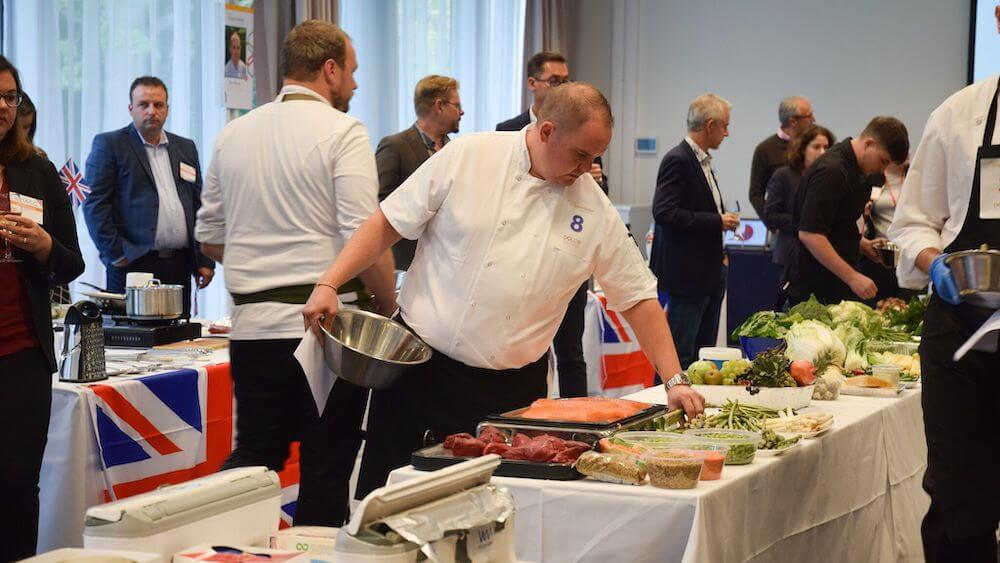
The spread at IACC’s 2019 Europe Knowledge Festival was all-vegan fare.
About six months before its 2019 Europe Knowledge Festival took place in Brussels, Belgium, Oct. 4-6, IACC (International Association of Conference Centers) set an ambitious goal for itself: to be an early adopter of the Events Industry Council (EIC) Sustainable Events Standards.
The recently released EIC Sustainable Events Standards — to which more than 100 event practitioners contributed — replace the council’s former APEX/ASTM Environmentally Sustainable Meeting Standards. Designed to be more globally relevant, the new standards were reviewed by events professionals from more than 15 countries and focus on environmental and social outcomes, rather than country-specific regulations and programs.
There are seven different standards, each representing a different meetings industry sector, from event organizers to F&B and venues. Event organizers are assessed on criteria that includes internal practices, climate action, supply chain management, accommodations, venue, F&B, destination, AV and production, and exhibitions (if their event includes an exhibit hall).
IACC made sustainability the overall theme of the 2019 Europe Knowledge Festival, featuring climate and environmental activist Nic Balthazar as keynote speaker. And beyond the programming, IACC communicated to delegates — who represent IACC-certified conference and meeting venues from across Europe — that it was working to deliver a sustainable event itself and had entered into a review process with EIC using the Knowledge Festival as a case study to earn the certification for event organizers. “We didn’t just do it,” Mark Cooper, IACC’s CEO, told Convene, “and not talk about it.”

The study tour was held in Antwerp.
Plan of Action
The revised EIC standards’ new points-based system provides greater flexibility in qualifying for certification. In order to reach a certification level — bronze, silver, gold, or platinum — applicants must demonstrate meeting the standards’ criteria. To attain bronze, an event must achieve 50 percent of available points; silver is 65 percent; gold is 85 percent; and platinum is 90 percent. Applicants can also apply for additional points for innovations or exemplary performance to help them reach a higher certification level.
Among other considerations, IACC earned points for the event’s vegan lunches, sustainably printed conference materials, waste management, refillable water stations, and shared transportation options — a pre-conference study tour of nearby Antwerp made use of trains and hybrid/electric cars.
Cooper said that communicating sustainability goals early on — prior to registration — helped attendees to embrace them. For example, he said, there was no pushback for entirely meat-free menus during the three days of the conference. The focus on sustainability, in fact, generated greater attendance — one IACC member who usually sends one or two staff members to this event instead sent seven, Cooper said, because of its eco-friendly program. Registrants “came to the event because the theme had relevance to them,” he said, “and they wanted to learn more.” Overall, attendee numbers at the 2019 Europe Knowledge Festival exceeded previous years, which is typically 130 delegates.
The Knowledge Festival concluded with a Solutions Café plenary session, in which attendees pledged to make three changes in order to host more sustainable events: the removal of single-use coffee cups from guest rooms and eradicating single-use plastic bottles, adopting a standard food-labeling system developed by IACC, and participating in an online repository for IACC members of information and organizations which provide advice on sustainable venue initiatives.
IACC’s efforts paid off: The association met EIC’s Sustainable Events Standards, as audited by a third-party provider. (As of now, the level IACC attained is still pending.)
IACC plans to apply for the certification again for its 2020 edition in Düsseldorf, Germany, this October, and Cooper said that he will appreciate having more than six months to plan for that and to step up efforts. For the 2019 event, IACC had to learn “very quickly” what initiatives they would need to put in place in order to qualify, he said. But in the end, the event’s success from the environmental standards perspective was due to the fact that it was a shared learning experience. “We undertook the journey together with our delegates,” Cooper said, “which was really special.”
Learn more about the EIC Sustainable Events Standards.
Jasmine Zhu is an associate editor at Convene.
